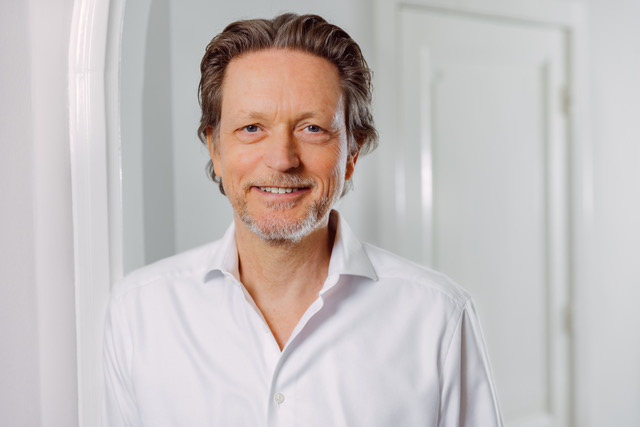Every morning before his day begins, Dr. Markus Rechlin spends half an hour reading or listening to something new. Sometimes it’s a podcast on leadership or an article about personal growth and human dynamics, but the goal is always learning.
He’s found that creativity starts with curiosity, but curiosity can only exist when there’s intentional space made for it. As the Managing Director of MAREVEST Beteiligungs GmbH, a Hamburg-based company specializing in consulting, investment, and new business development, Rechlin focuses on helping people and organizations think in new ways.
From his engineering studies to his consulting and leadership roles, his career has shown how innovation depends as much on mindset and teamwork as it does on technology.
The Making of an Innovative Engineer
Born in West Berlin, Rechlin spent his childhood in Berlin, Trier, and Kiel. After graduating from Kieler Gelehrtenschule in 1982, he studied mechanical engineering at Hannover University, completing his Vordiplom in 1984.
He continued his education at RWTH Aachen University, earning both his Diploma and Doctorate in Mechanical Engineering in 1991. Twice during his studies, he was awarded scholarships from the Studienstiftung des deutschen Volkes.
His early professional years were spent at Drägerwerk AG & Co. KGaA in Lübeck, where he served as Business Area Manager from 1994 to 2000.
During his time at Dräger Medical, he helped develop the Product Roadmap, a process that outlined the company’s product portfolio and R&D pipeline years in advance. This new system helped prioritize research projects, balance investment in development, and ensure that new products were launched efficiently.
While techniques like Design Thinking and Scrum proved valuable, Rechlin viewed them as tools rather than solutions.
“The best methods and tools don’t guarantee successful innovation,” he explained. “What makes the difference is the right mindset for innovation, exemplified by the top leadership team.”
What mattered most to him was not the process but the attitude behind it. That included the willingness to see mistakes as lessons and to keep pressing forward even when challenges arose.
“This mindset for innovation mustn’t be sacrificed for cost effectiveness,” he said.
To him, innovation and cost-efficiency can coexist, and his role is to reassess how resources are used, review the product portfolio, and make sure that ongoing projects continue to receive the support they need.
Observations Lead to Breakthroughs
During his years leading a manufacturing company, Rechlin noticed a small but meaningful pattern in customer behavior. Each December, as companies prepared to close their annual budgets, a wave of last-minute orders arrived from research and development departments eager to use their remaining funds.
Traditionally, the company kept inventory low to control costs, which meant they could not meet those sudden surges in demand.
Rechlin met with the head of production and supply chain to discuss the idea of changing from a pull-based strategy, where materials were ordered after receiving customer requests, to a push-based strategy, where materials would be prepared ahead of time.
“This would dramatically reduce the lead time for the delivery of machines,” he said.
The company’s recent IPO made it possible to pursue the idea, allowing for a larger investment in materials and production capacity. The decision proved transformative. Annual revenue doubled compared to the previous year, market forecasts were surpassed, the share price climbed, and the company earned a place on the TecDAX.
Reinventing How Modern Teams Succeed
In 2000, Dr. Markus Rechlin moved into consulting, taking on the role of Managing Director at CCP Capital Consulting Partners in Hamburg. Two years later, he joined The Boston Consulting Group as Principal. By 2004, he was serving as Executive Vice President of Portfolio at Bain Capital, working between London and Munich on growth, investment, and international business strategy.
Under his direction at MAREVEST Beteiligungs GmbH, the firm operates through a flexible model in which independent network partners collaborate remotely.
“With the new operating model, everybody works as independent network partners from home,” he explained. “The new operating model allows us to adjust capacity as needed and shift flexibly from investment activities to consulting and new business.”
Teams come together as projects require, meeting mainly by video and occasionally in rented workspaces. This enables MAREVEST to stay agile, efficient, and fully focused on its goals.
The Human Side of Innovation
Over time, Rechlin’s leadership philosophy has expanded to include a strong interest in human behavior. He believes that true innovation depends on understanding how people think, react, and interact, especially when they’re under pressure.
“Times are changing,” he said. “While there was a strong and somewhat exclusive leadership focus on productivity and speed in the past, today’s VUCA environment requires an additional focus on flexibility and creativity.”
Through his experience, he has learned how the autonomic nervous system shapes nearly every thought, feeling, and reaction, mostly without conscious awareness. When employees face constant stress, he explained, the body’s sympathetic nervous system triggers a fight-or-flight response that makes it nearly impossible to be creative. Unfortunately, he said, stress-filled environments are common in many workplaces today.
To counter that effect, Rechlin walks through the woods or along the shore, does breathing exercises, or meditates. From there, he can turn his attention to his team.
To protect employees from burnout, he created what he calls “protected islands,” periods of time set aside for uninterrupted, focused work on creative or strategic tasks. Every team member has the right to spend around ten percent of their time “on the island,” while those in more creative roles may need even more time. Everyone at MAREVEST knows when a colleague is on the island, and those blocks of time are respected.
“Being protected from interruptions and immediate demands is very valuable for fostering creativity and getting things done,” he said.
Curiosity Fuels Leadership
Learning, in every form, remains at the heart of how Markus Rechlin leads. Lately, he’s become even more interested in understanding the personal qualities that make leaders more authentic and effective.
“I am interested in what I consider essential for effective leaders: healthy self-esteem, secure attachment behavior, and the courage to show oneself unmasked and vulnerable,” he shared.
Alongside these human-centered interests, he follows emerging technology trends, from artificial intelligence to blockchain, while also studying topics that lie outside traditional business education. These include consciousness, energy fields, and quantum physics, which he believes will grow in significance.
“These have not yet been applied to day-to-day leadership in companies, but will, however, gain importance in the future,” he said.
Rechlin describes his relationship with the news as complex, noting that he tries to keep his consumption to a minimum.
When it comes to keeping his ideas organized, he relies on practical frameworks like mind mapping. Design Thinking is especially important when he’s working with teams because it helps them focus on the needs of real people instead of abstract goals.
Whether studying emerging technologies or exploring the human aspects of leadership, Rechlin’s curiosity continues to fuel his growth.
Turning Feedback Into Measurable Change
Earlier this year, Rechlin and his team completed a consulting project for a large shipping company that wanted to improve collaboration across its departments. Using what he calls the “team strengths” framework, they evaluated how employees worked together, measuring areas like cooperation, team spirit, engagement, and individual skills.
Then, they compared those results to earlier assessments. The data revealed measurable progress, which encouraged the company to expand the initiative and inspired Rechlin’s next venture.
“The positive results from the consulting project motivated us to launch Team Pulse Check, an easy online survey that gauges the current strengths of smaller teams with fewer than 100 members,” he said.
Team Pulse Check was designed to make evaluation both affordable and practical.
“The survey is automated, making it scalable and affordable even for small companies, as it costs no more than a team dinner,” he explained.
Unlike many surveys that end up forgotten in a drawer, Team Pulse Check converts feedback into clear steps rather than vague summaries.
“The main benefit is that the survey produces specific actions that systematically help strengthen the teams. Progress will be tracked through repeated surveys,” he said.
For Rechlin, innovation only matters when it leads to visible results. He measures success by the revenues and profits a project eventually delivers, but he sees the first signs of progress elsewhere. Stronger teamwork, higher engagement, and growing skills, he believes, are what make lasting growth possible.
Leaving Room to Grow
Rechlin’s career has been a continuous cycle of learning and application, proving that even the most complex challenges can be solved when people are given time to think deeply and freedom to experiment.
“The most extraordinary ideas are only as good as they are understood by those who might apply them,” he said.
For him, that understanding comes from patience, collaboration, and a genuine interest in how people grow and learn together. Through every phase of his career, he has carried one consistent lesson: innovation begins with curiosity and continues through those willing to keep asking questions.













